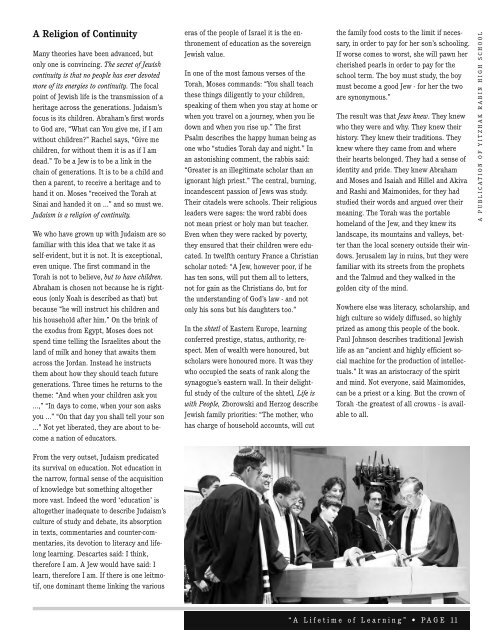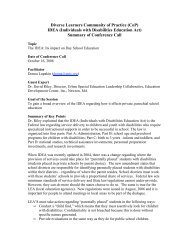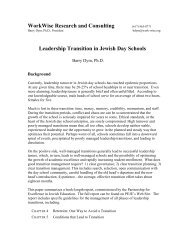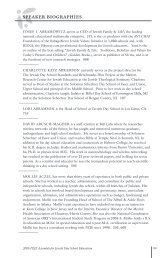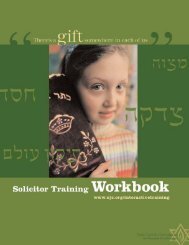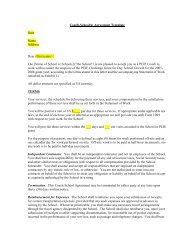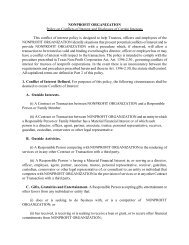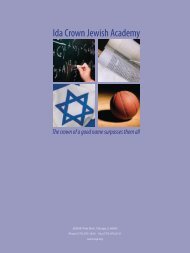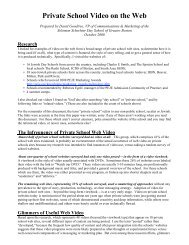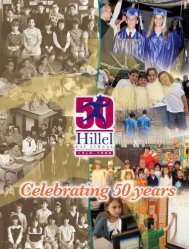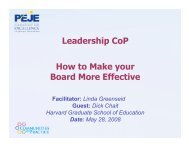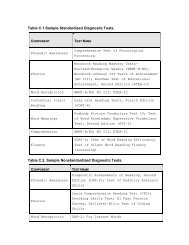âA Lifetim e of Learningâ - Partnership for Excellence in Jewish ...
âA Lifetim e of Learningâ - Partnership for Excellence in Jewish ...
âA Lifetim e of Learningâ - Partnership for Excellence in Jewish ...
You also want an ePaper? Increase the reach of your titles
YUMPU automatically turns print PDFs into web optimized ePapers that Google loves.
A Religion <strong>of</strong> Cont<strong>in</strong>uityMany theories have been advanced, butonly one is conv<strong>in</strong>c<strong>in</strong>g. The secret <strong>of</strong> <strong>Jewish</strong>cont<strong>in</strong>uity is that no people has ever devotedmore <strong>of</strong> its energies to cont<strong>in</strong>uity. The focalpo<strong>in</strong>t <strong>of</strong> <strong>Jewish</strong> life is the transmission <strong>of</strong> aheritage across the generations. Judaism’sfocus is its children. Abraham’s first wordsto God are, “What can You give me, if I amwithout children?” Rachel says, “Give mechildren, <strong>for</strong> without them it is as if I amdead.” To be a Jew is to be a l<strong>in</strong>k <strong>in</strong> thecha<strong>in</strong> <strong>of</strong> generations. It is to be a child andthen a parent, to receive a heritage and tohand it on. Moses “received the Torah atS<strong>in</strong>ai and handed it on ...” and so must we.Judaism is a religion <strong>of</strong> cont<strong>in</strong>uity.We who have grown up with Judaism are s<strong>of</strong>amiliar with this idea that we take it asself-evident, but it is not. It is exceptional,even unique. The first command <strong>in</strong> theTorah is not to believe, but to have children.Abraham is chosen not because he is righteous(only Noah is described as that) butbecause “he will <strong>in</strong>struct his children andhis household after him.” On the br<strong>in</strong>k <strong>of</strong>the exodus from Egypt, Moses does notspend time tell<strong>in</strong>g the Israelites about theland <strong>of</strong> milk and honey that awaits themacross the Jordan. Instead he <strong>in</strong>structsthem about how they should teach futuregenerations. Three times he returns to thetheme: “And when your children ask you...,” “In days to come, when your son asksyou ...” “On that day you shall tell your son...” Not yet liberated, they are about to becomea nation <strong>of</strong> educators.eras <strong>of</strong> the people <strong>of</strong> Israel it is the enthronement<strong>of</strong> education as the sovereign<strong>Jewish</strong> value.In one <strong>of</strong> the most famous verses <strong>of</strong> theTorah, Moses commands: “You shall teachthese th<strong>in</strong>gs diligently to your children,speak<strong>in</strong>g <strong>of</strong> them when you stay at home orwhen you travel on a journey, when you liedown and when you rise up.” The firstPsalm describes the happy human be<strong>in</strong>g asone who “studies Torah day and night.” Inan astonish<strong>in</strong>g comment, the rabbis said:“Greater is an illegitimate scholar than anignorant high priest.” The central, burn<strong>in</strong>g,<strong>in</strong>candescent passion <strong>of</strong> Jews was study.Their citadels were schools. Their religiousleaders were sages: the word rabbi doesnot mean priest or holy man but teacher.Even when they were racked by poverty,they ensured that their children were educated.In twelfth century France a Christianscholar noted: “A Jew, however poor, if hehas ten sons, will put them all to letters,not <strong>for</strong> ga<strong>in</strong> as the Christians do, but <strong>for</strong>the understand<strong>in</strong>g <strong>of</strong> God’s law - and notonly his sons but his daughters too.”In the shtetl <strong>of</strong> Eastern Europe, learn<strong>in</strong>gconferred prestige, status, authority, respect.Men <strong>of</strong> wealth were honoured, butscholars were honoured more. It was theywho occupied the seats <strong>of</strong> rank along thesynagogue’s eastern wall. In their delightfulstudy <strong>of</strong> the culture <strong>of</strong> the shtetl, Life iswith People, Zborowski and Herzog describe<strong>Jewish</strong> family priorities: “The mother, whohas charge <strong>of</strong> household accounts, will cutthe family food costs to the limit if necessary,<strong>in</strong> order to pay <strong>for</strong> her son’s school<strong>in</strong>g.If worse comes to worst, she will pawn hercherished pearls <strong>in</strong> order to pay <strong>for</strong> theschool term. The boy must study, the boymust become a good Jew - <strong>for</strong> her the twoare synonymous.”The result was that Jews knew. They knewwho they were and why. They knew theirhistory. They knew their traditions. Theyknew where they came from and wheretheir hearts belonged. They had a sense <strong>of</strong>identity and pride. They knew Abrahamand Moses and Isaiah and Hillel and Akivaand Rashi and Maimonides, <strong>for</strong> they hadstudied their words and argued over theirmean<strong>in</strong>g. The Torah was the portablehomeland <strong>of</strong> the Jew, and they knew itslandscape, its mounta<strong>in</strong>s and valleys, betterthan the local scenery outside their w<strong>in</strong>dows.Jerusalem lay <strong>in</strong> ru<strong>in</strong>s, but they werefamiliar with its streets from the prophetsand the Talmud and they walked <strong>in</strong> thegolden city <strong>of</strong> the m<strong>in</strong>d.Nowhere else was literacy, scholarship, andhigh culture so widely diffused, so highlyprized as among this people <strong>of</strong> the book.Paul Johnson describes traditional <strong>Jewish</strong>life as an “ancient and highly efficient socialmach<strong>in</strong>e <strong>for</strong> the production <strong>of</strong> <strong>in</strong>tellectuals.”It was an aristocracy <strong>of</strong> the spiritand m<strong>in</strong>d. Not everyone, said Maimonides,can be a priest or a k<strong>in</strong>g. But the crown <strong>of</strong>Torah -the greatest <strong>of</strong> all crowns - is availableto all.A P U B L I C A T I O N O F Y I T Z H A K R A B I N H I G H S C H O O LFrom the very outset, Judaism predicatedits survival on education. Not education <strong>in</strong>the narrow, <strong>for</strong>mal sense <strong>of</strong> the acquisition<strong>of</strong> knowledge but someth<strong>in</strong>g altogethermore vast. Indeed the word ‘education’ isaltogether <strong>in</strong>adequate to describe Judaism’sculture <strong>of</strong> study and debate, its absorption<strong>in</strong> texts, commentaries and counter-commentaries,its devotion to literacy and lifelonglearn<strong>in</strong>g. Descartes said: I th<strong>in</strong>k,there<strong>for</strong>e I am. A Jew would have said: Ilearn, there<strong>for</strong>e I am. If there is one leitmotif,one dom<strong>in</strong>ant theme l<strong>in</strong>k<strong>in</strong>g the various“ A L i f e t i m e o f L e a r n i n g ” • P A G E 11


